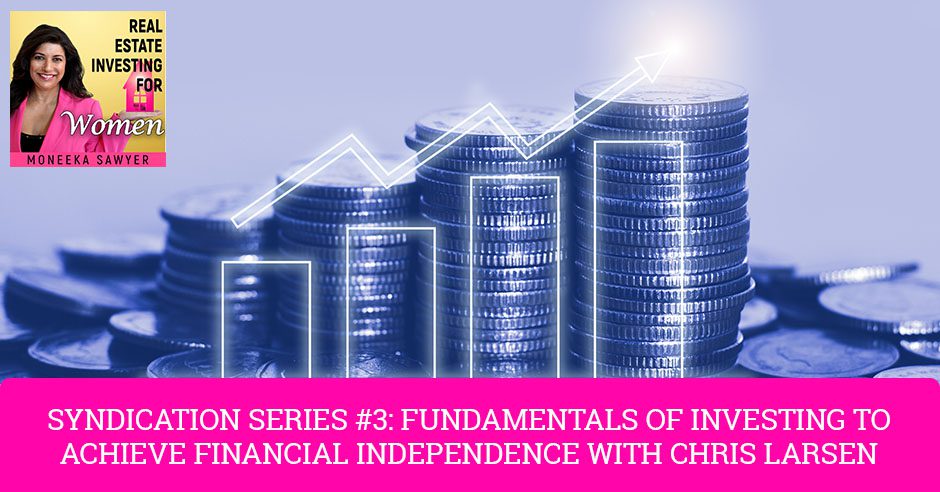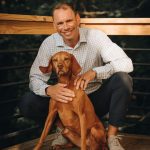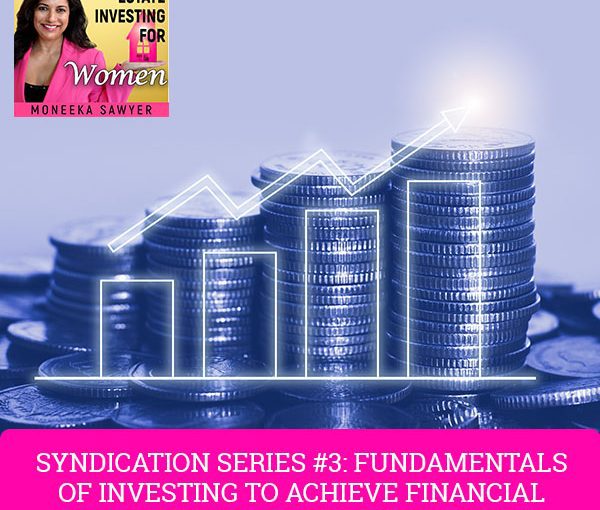Syndication Series #3: Fundamentals Of Investing To Achieve Financial Independence With Chris Larsen

Real estate is the best path towards achieving financial independence. Becoming financially independent means having the choice to do what you want with your time. In this episode, Moneeka Sawyer sits down for some great insights into real estate with investor, author and entrepreneur, Chris Larsen of Next Level Income. We hear Chris narrate what got him into real estate, starting from single family to commercial real estate. Chris also shares his investing strategy and how Infinite Banking works, and how to leverage your insurance policy for cashflow. Drop by and listen in as Chris and Moneeka share valuable information for investors to use.
—
Watch the episode here
Listen to the podcast here
Syndication Series #3: Fundamentals Of Investing To Achieve Financial Independence With Chris Larsen
Real Estate Investing For Women
In this episode, I am so excited to welcome to the show, Chris Larsen. He is the Founder and Managing Partner of Next-Level Income. Chris has been investing and managing real estate for several years. While still a college student, he bought his first rental property at the age of 21. I love people that get into this industry young.
From there, he expanded into development, private lending, buying distressed debt, as well as commercial offices and ultimately syndicating multifamily properties. He began syndicating deals in 2016 and has been actively involved in over $225 million of real estate acquisitions. He is passionate about helping investors become financially independent. Chris, welcome to the show.
Thank you so much for having me. I’m excited to be here.
I’ve been looking forward to this show and you’ve been so patient with me with all the rescheduling. Thank you. I’m glad we’re finally here. Chris, give us a high level of your story. I know it’s very exciting.
First off, I love that you bring up to get started early. Now it’s early, whenever you can do it. I was 21 when I was in college. My passion at the time was racing bicycles. I went to Virginia Tech for Biomechanical Engineering. I did pretty well in school and I was told like, “You should be an engineer like your grandfather.” All I want to do is race bicycles.
Cycling is like a real engineer sport because it’s all about numbers and power to weight ratios. At that time, drug which I wasn’t into. That was the end of my story in a lot of ways because I didn’t want to do that. Along the way, at that same time, when I was at this turning point, trying to decide what to do as I was looking towards a professional career, my best friend, roommate and training partner passed away. He had a massive brain hemorrhage between my freshmen and sophomore year in college.
I poured another year into the sport and then I realized even after I was winning more and more races, that I wasn’t happy. Even though my team went professional, I didn’t. I stepped away from the sport, went back to school. As a junior in college, I thought like, “What the heck am I going to do with my life? I don’t want to be an engineer. I was going to go race and then figure out what I wanted to do.” While I was racing and even when I was young, the first thing I remember and probably if you’re reading, you think the same thing. You hop on your bike and you have this tremendous sense of freedom. That’s what I wanted.
I wanted the freedom to live life on my own terms to respect not only the life I was giving them but also the life of the friend that I lost. I turned towards investing. I was introduced to it by the same gentleman, Clint Provenza, who introduced me to cycling. My father passed away at five and he was a real mentor to me. I started looking into investing. I was day trading, and one of those nights/mornings that 3:00 AM, when I was laying there in bed, thinking about what I should do with my trades. I thought like, “Do I want to be doing this twenty years from now?” The answer was no.
I looked at other investments. I read over 250 books on money, investing and settled on real estate because you could control it. I bought my first property at 21. I built and managed a portfolio of single-family rentals for fifteen years but ultimately transitioned into commercial real estate. That’s what we focus on. I try to enlighten people and share my mistakes, so they can take the fast track to get towards financial independence, which took me a couple of years.
It’s so interesting. I have a very similar story in that. I wanted to be a dancer and that was my thing. I came to investing for a similar reason. I wanted a life of choice. I think that freedom of choice is our true wealth. That’s what I wanted and real estate allowed that. It did take me several years before I could say I could retire, my husband and I, but I couldn’t do with the lifestyle that I wanted in California. We would have had to move, so we continued to grow our portfolio, but it was the same thing. After several years, we are doing everything now that we’re doing because of the choice and we want to do that. There’s nothing more liberating than that.
At some point, income is important, but it’s the freedom to choose that brings happiness.
I think studies show. I teach a financial literacy course here. It’s high school students coming out of underprivileged homes. Most of them are living below the poverty line. We had a conversation about, at some point, income is important, but it’s the freedom to choose. I cited the study that shows the janitors that have freedom in their day-to-day choices are happier than the CEOs that are making 10,000 times now what they are, but they’re not happy because they don’t have freedom.
My TED Talk is about this and there’s a lot of research about there’s a threshold where money does buy happiness to a certain threshold. The original number they came up with within 2010 was $75,000, but a study was done in January 2021 that said it was $100,000. It’s gone up because of inflation. Whatever that number is, it’s $100,000 now.
Up until then, the number of dollars that you bring into your household does relate directly to the level of happiness in the household or the level of satisfaction. After that, now we have freedom and excess income. We are taken care of and now we can focus on joy, bliss. I’m so glad we’re on the same wavelength around that. Tell me about this concept of infinite banking.
Next-Level Income was born of this desire to curate information around financial literacy and education. As I built it out, we have three main areas. We talk about how to make, keep and grow your money. Those are the three steps. I have coaching clients and that’s what we work through like, “How can you maximize how much money you’re making? How can you keep more money?”

Financial Independence: Freedom of choice is our true wealth. Real estate allows that.
Thank you so much. Talk to me about your perspective on multifamily. This is a hot topic with my ladies.
I call multifamily real estate the holy grail of investing. If you look at my book, it says How to Make, Keep, and Grow Your Money Using the ‘Holy Grail of Real Estate’ to Achieve Financial Independence. I’ll send you a copy for free if you go to the website. I’m so high on multifamily. I was the person that managed my portfolio for fifteen years.
I was the person that got the phone call on my honeymoon in Costa Rica and paid $40 and collect call fees to deal with a problem tenant. I was the guy that stayed in too long and didn’t get a great return on my properties. I was also the guy that was fortunate enough to run into somebody that introduced me to this space. I started to investigate multifamily real estate and I’m a demographics guy. I spent eighteen years in the medical device industry. That’s how I made the money to invest. I got into a medical device.
I moved and lived in Asheville, North Carolina, because we have great demographic trends. When I started to investigate multifamily being an engineer, day-to-day guy and analytical, I found that multifamily was supported by these terrific demographics by what we now call the Millennials. They rented and guess who’s supporting multifamily now? It’s their parents, the Baby Boomers. They’re selling their homes and renting and now Gen Z is renting as well. We’ve turned into this nation that we like to own the American dream, but also flexibility.
I jumped into multifamily because of the demographics and the analytics. My MBA is in Portfolio Managementhat I found is something that Ray Dalio calls The Holy Grail of Investing, which allows you to increase the Sharpe ratio. The Sharpe ratio increases the returns of your portfolio and decreases the risk. It’s like a boat that goes faster and it has less bumps when you’re on it. I thought, “What is better than that?” Ray Dalio calls that The Holy Grail of Investing. I call multifamily the Holy Grail of Real Estate because it allows you to increase the returns in your portfolio and allows you to decrease the risk.
I know that in EXTRA, we’re going to talk a lot more about multifamily. We’re going to go deeper to the pros and cons of multifamily and then he’s going to do some number breakdowns for us. These are things that I get asked about a lot. It’s not my strong suit. My husband and I have not been involved yet in multifamily. The commercial evaluation of the numbers is not his strong suit, so he hasn’t had to do it yet. This will be fun. EXTRA will be talking a lot about that stuff, but why don’t you give us a high level on why you like multifamily? What’s so exciting about it?
There are a few things. If you’re reading and you’re like, “I love real estate, but I don’t want to be the person that has to go in and fix toilets, find new tenants, screen people and do showings and all that.” I get that because I’ve done it. The big thing is if you invest in multifamily with an experienced operator, it’s 100% passive. You can invest, be a direct owner, get the income, the depreciation and the depreciation of great tax benefits, especially if you’re a high-income earner, but you don’t have to deal with it all yourself. That’s fantastic. It’s scalable.
You could buy a 100 unit multifamily building for $10 million. You could buy a $1 billion multifamily portfolio. Whether you’re investing in your first deal or you’ve been investing for twenty years and you’re looking to place $1 million or $10 million of capital, you can use the same strategy. It’s very scalable. There’s something that I like even more, it’s the control. You might’ve heard me talk about laying in bed at 3:00 AM feeling like things were out of control with my money. I like real estate because you can control it.
We’re acquiring a property in Greenville, South Carolina and we live in Asheville, which is about an hour away. We were down in South Carolina for my son’s 9/11 lacrosse game. I took him to the property and we drove around. It was built in 1997. It’s a little beat up. The stairs needed to be replaced. They need new paint. We can control all of those things. If you own a business, apartments are valued like a business. They’re valued by net operating income. If you live in your home or you have a rental home and it’s 1,000 square feet, and it sells for $300 a square foot, it’s worth $300,000. It’s easy math.

Financial Independence: Next Level Income was born of this desire to curate information around financial literacy and education.
The bank figures that out because they say, “The home on your right is worth $305 a square foot, on your left is worth $295 a square foot.” Yours is about $300 a square foot. You don’t control that. The market goes up and down. If we go and buy an apartment building for $10 million and it has $1 million of net operating income, that’s probably not a great metric. Call it a $20 million apartment building with $1 million in net operating income.
We increase the net operating income 50% from $1 million with a $20 million to $1.5 million new valuation. You’re probably thinking to yourself when your cap rate is $30 million. We control that when we’re able to move the rents by the renovations, operations, being more efficient, bringing better management and those sorts of things. Again, it’s passive and scalable, but most importantly, it’s controllable.
I’m sure some of you are like me going, “Wow,” but we will break this down so you can go through this again and we’ll break down more of that in EXTRA so we can take it a little bit slower. I feel like you already covered this. What are the important metrics? What exactly should we be looking at?
I’ll dive a little deeper again. We can unpack this a lot more in the EXTRA section. I started as an investor in these deals. I was called a limited partner before I syndicated these deals and became a general partner. If you’re a limited partner and you say, “I’m interested in this.” You need to look at three different things. You need to look at geography. Are you investing in an area of the country that people want to move to? I wrote a whole blog post about this. I talked about how you can identify these. It’s very easy to see with reports from companies like United Van Lines. You can go on our blog at the beginning of 2021 and read the post I put on there.
You want to be in large cities where people are moving, that is growing faster than the national average. Where are these cities? A lot of these are from the Southeast. I moved to North Carolina for the demographics, the Carolinas, Florida, Georgia, Texas, Phoenix, Colorado and Boise, Idaho seems to be a big one here. Why are people moving here? They’re moving out of California to places like Colorado, Texas and Idaho.
They’re moving to the Southeast from places like California, LA, New England and New York. The places that are cold and don’t have a great quality of life. Taxes are going up. I have a coaching client. He told me and he’s like, “We’re looking at South Carolina to move. Taxes are going up. We don’t want to live here anymore.” Number two, the operator. Are you working with an operator? This is somebody that’s going, finding and buying the property. That’s going to bring you in alongside them and then they’re going to operate it. They’re going to increase that net operating income.
Have they done it before? Have you done it in the geography that you’re invested in? What is their experience there? You want to ask him some tough questions about what’s their strategy. You look at the metrics in the deal. That’s pretty complex. We looked at over two dozen different metrics on the deals that we’re in, and there are a lot of different variables that come into play. Again, if you’ve ever invested in a business, if you’re a business owner or professional, you can read a financial statement.
That’s the thing. If you call me and say, “I’m interested in this deal.” As an owner of this property, you’re entitled to all the same information that you would be entitled to if you own a single-family home. You can go through those and you can call the operator and say, “Walk me through this. What am I seeing here and there?” Don’t be afraid to ask those questions and understand the numbers, strategy and why an operator is going into the market.
Talk to me a little bit about ROI. Different operators do this differently. Tell us a little bit about how you structure your deals for your investors.
What we do is called syndication. Syndication is very simple, it is someone, an operator going out and bringing in investors alongside them to invest. What’s important is how that syndication is structured. What we do is we do what’s called a preferred return. If you look at deals, say 6% to 8%, what does that mean? That means investors get the first 6%to 8% of the returns coming from that property. Investors are preferred in front of anybody else. They’re going to be subordinate to the lender.
The other thing that’s nice about these properties is it’s called non-recourse debt. I work with a lot of doctors after spending several years in the medical device profession. They don’t want more risk, more debt and a bank to come after them for something. They have patients that are out for them if something bad happens. That’s a nice thing about these properties as well.
After taxes, the next biggest expense that a lot of people don’t think about is financing.
After the lender, the investors get that preferred return. There’s an equity split. That split is a large part that goes to investors and then the partners that organize these deals get the minority position in there, but that’s the incentive. You want to work with the group, in my opinion. How we do it is we give the investors the first big portion of the returns, about a half of the returns upfront. The other half comes from that split on the backside and then we as partners get a piece of that split.
We’re incentivized to maximize the profit of that property on the backend. You asked a question there and I’ll address this. There are a couple of different ways to look at this. You can look at a total return. You’re going to get a 10% return comprised of half cash and half appreciation on a property. There’s also an equity multiple. You’re going to double your money over a certain period of time, it’s another way to look at it. There’s also what’s called the IRR, the Internal Rate of Return.
We can dive deeper into the EXTRA portion of the show or you can go ahead and check out my book, which goes deeper into this as well. You can always read on a site like Investopedia, which dives deeper too. It depends on what type of investor you are. Maybe cash or the total return is important to you. It all depends on what type of investor you are.
Do you pay investors immediately? When they first invest money, are they guaranteed a certain return each year while the project is happening? How do you structure that for your people?
One little red flag is we never say guaranteed because these are investments that have a risk associated with them. If you ever hear me say guaranteed, you should either slap me on the face with a stick and a paper towel or something in my mouth too. We have a couple of different types of investments. We have investments that we pay investors a fixed return based upon the performance of the property. Our group pays out monthly. We like to pay out monthly. There are groups that payout quarterly. It’s not necessarily better or worse, but personally, I like to get money in my account every month.
You then get some stuff on the backend depending on how the project goes.
In multifamily syndication, you’re going to get regular cashflow monthly, quarterly or annually. When the property sells, think about it like a rental property. You’re getting rent. If you’re renting it out for $1,000 a month and your expenses are $900, you might get $100 a month. When you sell it, if you bought a property for $100,000 and you sell it for $150,000, you get that $50,000 profit on the backend. It’s very similar to that.
Do you guys do the whole refinance structure piece too or do you go for the sale?
When we model out the returns on a property which is called the pro forma, we don’t assume we’re going to refinance the property. If you’ve ever owned a rental property or you have a property of your own, what’s nice is if you have a HELOC, a Home Equity Line Of Credit and you pull money out of your home or an investment property, you don’t pay taxes on that when you pull that money out.
You might pay taxes when you sell it, but you don’t pay taxes when you pull it out. It’s very similar to what we do. A lot of times, we look to do that if the property is performing. We don’t tell investors that’s part of the plan because we want to be a little bit more conservative than that but that is a very optimal way to pull an investor capital out in a tax-efficient manner.
While we dove pretty deep into all of that stuff and I know we’re going to get even deeper, so definitely stay tuned for EXTRA. We’ll be talking more about the fundamentals of multifamily investing and the numbers around that and also the why or why not to do it.
Before we move into our three rapid fire questions, I want to let you ladies know how you can get in touch with Chris because he’s amazing, isn’t he? He’s got two awesome offers for you today. First of all, he’s going to give you his book for free and he and I are holding a webinar together so that you can meet him live and ask as many questions as you’d like.
Learn how you can invest like the rich to create true freedom for yourself by getting a free copy of his book nextlevelincome.com/bliss, where he’ll send you a copy of his book for free.
Also join Chris and me for a free webinar designed just for you to get informed and ask questions about how Chris does syndication and how he can help you to save the date. December 2nd, at 4:00 PM Pacific time. Go to blissfulinvestor.com/syndicationwebinar. That’s blissfulinvestor.com/syndicationwebinar.

Financial Independence: Syndication is very simple. It’s an operator going out and bringing in investors alongside them to invest.
I didn’t tell you this, Chris, but we have three rapid-fire questions. Are you ready?
I love it. I’m ready. I told you I’m wide open here, so let’s do it.
Tell us one super tip on getting started investing in real estate.
The best tip I can think of is to find somebody that has gone down the path you want to go down and either ask them for advice or hire them to help be a mentor.
What would you say is a strategy to be successful in real estate investing?
I think success, in general, is habits. Whether you want to be successful in real estate, successful in life, losing weight or whatever it may be, you need to focus on your daily habits. If you want to be successful in real estate, that may be in as far as syndications or passive investments or reviewing a deal every day or every week. If you are going out and buying your own properties, that may be contacting brokers, making phone calls and getting options out there that are coming in towards you on a regular basis.
What would you say is one daily practice that you do that contributes to your personal success?
I’ve learned a lot over the past years. I bought my older son The Five Minute Journal for Kids. It is basically a gratitude practice. I know you’re big on this. I think happiness comes before success. You have to get in that right mindset, the abundance mindset, which is what you share. You know that success and that money will come to you and there’s always a deal out there. You don’t have to worry and fight over these things. Share, help other people and other people will help you get in the right mindset. That’s what I try to do every day.
This has been an amazing show. Thank you so much for all you’ve already contributed, Chris. This has been great.
It’s my pleasure. Thank you so much for having me.
Before we close out the show, I want to head off any confusion we might have about upcoming webinars. So in order to make this series the most valuable possible for you, I have arranged to have two webinars during the next couple of weeks.
The first one is going to be with Dr. Sam, who you heard from a couple of weeks ago. He is an investor just like you ladies. And he has figured out how to evaluate syndication opportunities that come across because he gets a lot of them. And if you’re interested in them and you put your name out there, you will start to get a lot of them. You’ll learn how he evaluates them so he can figure out which projects are the best for him regarding his risk tolerance, his capital availability, and what kinds of projects he’s actually interested in, like location and that sort of thing.
Dr. Sam has developed a tool he’s now sharing. So we’re going to do a webinar with him and you can talk to him about what it’s like to be an investor in syndications and what to expect. And then also he’s going to go through his tool specifically and show you how he’s evaluating different projects. So I’m really excited about this because you actually get to have a conversation LIVE with another investor who’s actually doing investing in syndication projects. So in order to sign up for that webinar, go to blissfulinvestor.com/Samwebinar. So that’s for Dr. Sam, right? So blissfulinvestor.com/Samwebinar. And that webinar is going to be held this week on Thursday, November 18th at 5:00 PM Pacific time. So again, that’s Thursday, November 18 at 5pm pacific time. Go to blissfulinvestor.com/Samwebinar.
The second webinar we’re doing for the syndication series is with Chris, who we just heard from in this episode. As you know, he’s an operator. So he’s going to be able to answer questions about how syndications actually work, how they’re put together and all the details of what you can expect from an operator. So that’s really exciting because you can ask as many questions as you want from an actual operator LIVE. So that’ll give you more confidence what you need to know with regards to how syndications are run. So I’m super excited about this one too. And this one is on Thursday, December 2nd, at 4:00 PM Pacific time. So that’s Thursday, December 2nd at 4:00 PM Pacific time. And to sign up for this one, go to blissfulinvestor.com/syndicationwebinar. So that’s blissfulinvestor.com/syndicationwebinar.
So to give you a really quick recap, Dr. Sam, who is an investor and is going to be sharing his evaluation tool, we’ll be holding a webinar this week on Thursday, November 18th at 5:00 PM Pacific time . Go to blissfulinvestor.com/Samwebinar.
And then Chris Larson will be holding a webinar as an operator on Thursday, December 2nd, at 4:00 PM Pacific time, just go to blissfulinvestor.com/syndicationwebinar.
I think you’re going to love both webinars because you’ll get two completely different perspectives. So don’t miss them sign up now.
Stay tuned for EXTRA. We’re going to be talking more about the fundamentals of multifamily. If you are not subscribed but would like to be, please go to RealEstateInvestingForWomenEXTRA.com. You get the first seven days for free. Check it out, download as much as you can and you can stay if it’s for you. Thank you so much for joining us for this portion of the show. We appreciate you. I look forward to seeing you and until then remember, goals without action are just dreams. Get out there, take action and create the life your heart deeply desires.
Important Links
- blissfulinvestor.com/Samwebinar
- blissfulinvestor.com/syndicationwebinar
- Becoming Your Own Banker
- Next-Level Income
- TED Talk – Who is the Boss of You?
- Ray Dalio
- Where Should You Move? 5 Ways To Take Advantage Of “Geographic Arbitrage.”
- United Van Lines
- The Five Minute Journal for Kids
- RealEstateInvestingForWomenEXTRA.com
About Chris Larsen
 Christopher Larsen is the founder and Managing Partner of Next-Level Income. Since “retiring” after 18 years in the medical device industry he dedicates his time to helping others become financially independent through education and investment opportunities. Chris has been investing in and managing real estate for over 20 years. While completing his degree in Biomechanical Engineering and M.B.A. in Finance at Virginia Tech, he bought his first single-family rental at age 21. Chris expanded into development, private-lending, buying distressed debt as well as commercial office, and ultimately syndicating multifamily properties. He began syndicating deals in 2016 and has been actively involved in over $400M of real estate acquisitions. In addition to real estate, Chris has invested in equities, oil & gas, and small business lending, as well as being active in Venture South, one of the nation’s Top 10 Angel Investing groups. Chris lives with his wife and two boys (and Viszla, Lucy!) in Asheville, NC where he loves spending time with them in the outdoors and enjoying the food and culture that the region has to offer.
Christopher Larsen is the founder and Managing Partner of Next-Level Income. Since “retiring” after 18 years in the medical device industry he dedicates his time to helping others become financially independent through education and investment opportunities. Chris has been investing in and managing real estate for over 20 years. While completing his degree in Biomechanical Engineering and M.B.A. in Finance at Virginia Tech, he bought his first single-family rental at age 21. Chris expanded into development, private-lending, buying distressed debt as well as commercial office, and ultimately syndicating multifamily properties. He began syndicating deals in 2016 and has been actively involved in over $400M of real estate acquisitions. In addition to real estate, Chris has invested in equities, oil & gas, and small business lending, as well as being active in Venture South, one of the nation’s Top 10 Angel Investing groups. Chris lives with his wife and two boys (and Viszla, Lucy!) in Asheville, NC where he loves spending time with them in the outdoors and enjoying the food and culture that the region has to offer.
Love the show? Subscribe, rate, review, and share!
______________________________________
To listen to the EXTRA portion of this show go to RealEstateInvestingForWomenExtra.com
To see this program in video:
Search on Roku for Real Estate Investing 4 Women or go to this link: https://blissfulinvestor.com/biroku
On YouTube go to Real Estate Investing for Women
Moneeka Sawyer is often described as one of the most blissful people you will ever meet. She has been investing in Real Estate for over 20 years, so has been through all the different cycles of the market. Still, she has turned $10,000 into over $5,000,000, working only 5-10 hours per MONTH with very little stress.
While building her multi-million dollar business, she has traveled to over 55 countries, dances every single day, supports causes that are important to her, and spends lots of time with her husband of over 20 years.
She is the international best-selling author of the multiple award-winning books “Choose Bliss: The Power and Practice of Joy and Contentment” and “Real Estate Investing for Women: Expert Conversations to Increase Wealth and Happiness the Blissful Way.”
Moneeka has been featured on stages including Carnegie Hall and Nasdaq, radio, podcasts such as Achieve Your Goals with Hal Elrod, and TV stations including ABC, CBS, FOX, and the CW, impacting over 150 million people.

